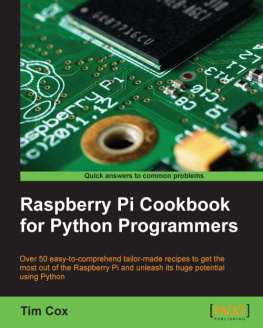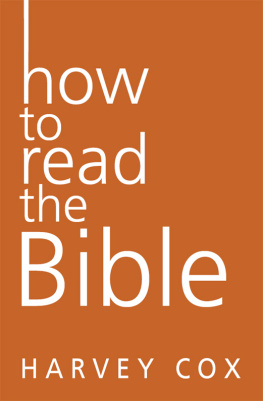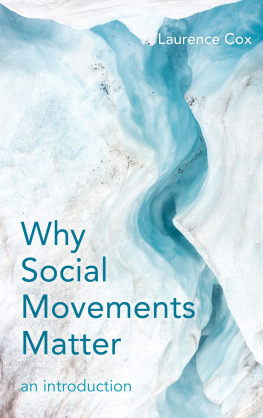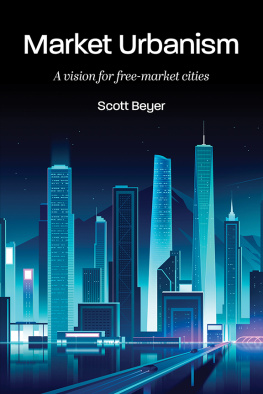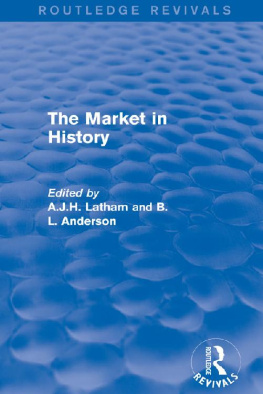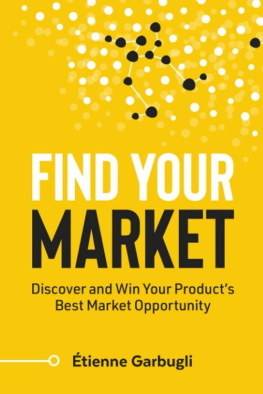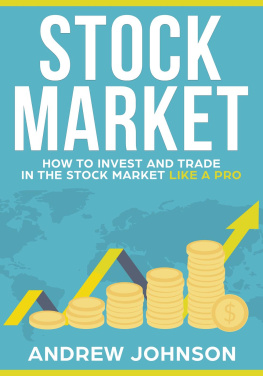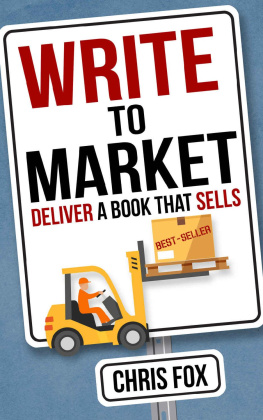Cox - The market as God
Here you can read online Cox - The market as God full text of the book (entire story) in english for free. Download pdf and epub, get meaning, cover and reviews about this ebook. City: Cambridge;Massachusetts etc, year: 2016, publisher: Harvard University Press, genre: Religion. Description of the work, (preface) as well as reviews are available. Best literature library LitArk.com created for fans of good reading and offers a wide selection of genres:
Romance novel
Science fiction
Adventure
Detective
Science
History
Home and family
Prose
Art
Politics
Computer
Non-fiction
Religion
Business
Children
Humor
Choose a favorite category and find really read worthwhile books. Enjoy immersion in the world of imagination, feel the emotions of the characters or learn something new for yourself, make an fascinating discovery.

The market as God: summary, description and annotation
We offer to read an annotation, description, summary or preface (depends on what the author of the book "The market as God" wrote himself). If you haven't found the necessary information about the book — write in the comments, we will try to find it.
Cox: author's other books
Who wrote The market as God? Find out the surname, the name of the author of the book and a list of all author's works by series.
The market as God — read online for free the complete book (whole text) full work
Below is the text of the book, divided by pages. System saving the place of the last page read, allows you to conveniently read the book "The market as God" online for free, without having to search again every time where you left off. Put a bookmark, and you can go to the page where you finished reading at any time.
Font size:
Interval:
Bookmark:
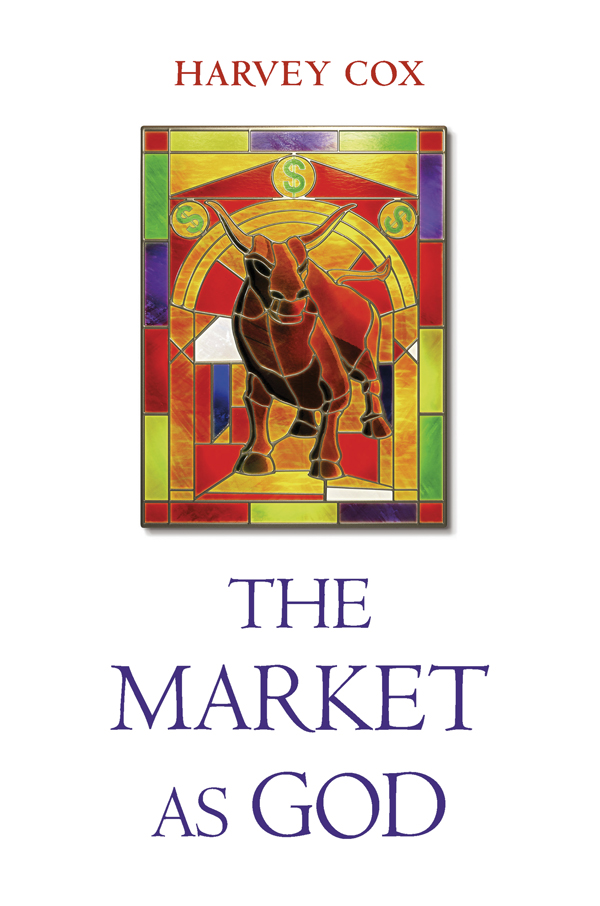
THE MARKET AS GOD
Harvey Cox


Cambridge, Massachussetts
London, England
2016
Copyright 2016 by Harvey Cox
All rights reserved
Jacket image: Ryan Etter Getty Images
Jacket design: Annamarie McMahon Why
978-0-674-65968-1 (alk. paper)
978-0-674-97315-2 (EPUB)
978-0-674-97316-9 (MOBI)
The Library of Congress has cataloged the printed edition as follows:
Names: Cox, Harvey, author.
Title: The market as god / Harvey Cox.
Description: Cambridge, Massachusetts : Harvard University Press, 2016. | Includes bibliographical references and index.
Identifiers: LCCN 2016014998
Subjects: LCSH: Money marketMoral and ethical aspects. | Financial institutionsMoral and ethical aspectsUnited States. | EconomicsMoral and ethical aspects. | EconomicsReligious aspects.
Classification: LCC HG226 .C69 2016 | DDC 174/.4dc23 LC record available at https://lccn.loc.gov/2016014998
This book is dedicated to Pope Francis with gratitude and hope
We have created new idols. The worship of the ancient golden calf (cf. Ex 32:135) has returned in the idolatry of money. In this system whatever is fragile, like the environment, is defenseless before the interests of a deified market.
Pope Francis
In November 2013, the recently elected Pope Francis issued a document entitled Evangelii Gaudium (The Joy of the Gospel). Neither in Latin nor in English was the title designed to attract a huge readership. But as the news began to spread of what it said, the fifty-thousand-word apostolic exhortation became one of the most controversial and widely discussed writings in recent memory. Undoubtedly the reason for its instant notoriety was that the pope includes a stinging critique of todays unbridled consumerism and economy of exclusion and inequality. He notes that some people continue to defend trickle-down theories which assume that economic growth, encouraged by a free market, will inevitably succeed in bringing about greater justice and inclusiveness in the world. His Holiness begs to differ. This opinion, he says, expresses a crude and nave trust in the goodness of those wielding economic power and in the sacralized workings of the prevailing economic system. Meanwhile, the excluded are still waiting [and] a globalization of indifference has developed. Later he speaks about a deified market and ideologies which defend the absolute autonomy of the marketplacea system, he says, which tends to devour everything which stands in the way of increased profits.
These are bold and controversial claims, of a kind one does not normally expect from papal statements. But Francis is speaking as someone who, unlike most previous prelates, knows poverty firsthand. He has spent many days visiting his people in the crowded tarpaper slums of Argentina. His first trip as pope was to the Mediterranean island of Lampedusa, where the bodies of desperate refugees who tried to flee hunger wash up on the shore. More recently he visited with the excluded and exploited indigenous people of Chiapas, Mexico.
The importance of this document, however, is that Francis goes beyond the moral outrage many feel about these injustices. What caught my eye in particular was the popes use of explicit religious language like the sacralized workings of the prevailing economic system and a deified market. What was Francis intending with these phrases? Was he just waxing metaphorical, or was he lifting the ordinary critique of the suffering caused by economic inequality out of the strictly moral idiom in which it is usually phrased, and raising it to a theological level? Did he really believe that what he called unrestricted consumer capitalism had become a quasi-religion, maybe even a heresy?
These questions piqued my interest because I had personally spent some time considering the nature of our societys faith in markets. Some years ago, a friend advised me that if I wanted to know what was going on in the real world, I should skip the front page of the New York Times and turn immediately to the business section. Although my lifelong interest has been in the study of religion, I am always willing to expand my horizons, so I took the advice, vaguely fearful that I would have to cope with a new and baffling vocabulary.
I did not. Instead I was surprised to discover that most of the concepts I ran across were strangely familiar. Expecting a terra incognita, I found myself instead in the land of dj vu. The lexicon of the Wall Street Journal, Financial Times, and Economist turned out to bear a striking resemblance to Genesis, the Epistle to the Romans, and Saint Augustines City of God. Behind descriptions of acquisitions and mergers, monetary policy, and the convolutions of the Dow and the NASDAQ, I gradually made out the pieces of a grand narrative about the inner meaning of human history, why things go wrong, and how to put them right. Theologians call these myths of origin, legends of the fall, and doctrines of sin and redemption. Here they were again, and in only thin disguise: chronicles about the creation of wealth, the seductive temptations of over-regulation, captivity to faceless business cycles, and, ultimately, salvation through the advent of free markets, with a small dose of ascetic belt-tightening along the way for those economies that fall into the sin of arrears. I realized then that my many years of studying religion and theology had prepared me to approach this mysterious thing called the economy more knowingly than I could have guessed.
On June 18, 2015, Pope Francis released a longer teaching he entitled Laudato Si which addresses the growing planetary crisis brought on by climate change. In this encyclical the pope continued to decry those who put profits above the health of the earth, and questioned the idea that current economics or market growth could head off the climate catastrophe toward which we are hurtling, or the starvation and poverty it will bring. I have never believed the old Vatican adage Roma locuta, causa finita (Rome has spoken, the matter is closed) but I was gratified to see that, at least in this matter, the bishop of Rome and I were on the same page. The crisis that our current economic practices have created for what he calls our common home is not just an economic one, and even more than a moral one. It is a spiritual, even theological, crisis and must be understood at that level.
I do not believe Pope Francis is speaking just metaphorically any more than I believe he is indulging in hyperbole when he equates the early death caused by economic inequality with the murder forbidden by thou shall not kill. He is drawing our collective attention to what has become a powerful and all-encompassing worldview, a vision of reality that pulls everything into its orbit and that should therefore be recognized as a kind of religion. The phrase religion of the market is not just a figure of speech. Faith in the workings of markets actually takes the form of a functioning religion, complete with its own priests and rituals, its own doctrines and theologies, its own saints and prophets, and its own zeal to bring its gospel to the whole world and win converts everywhere. The fact that acolytes of the market faith do not formally acknowledge it as a religion does not change this reality. Only when we have seen it for what it is can we appreciate the profound challenge the market faith poses and the depth and scope of our global crisis.
Font size:
Interval:
Bookmark:
Similar books «The market as God»
Look at similar books to The market as God. We have selected literature similar in name and meaning in the hope of providing readers with more options to find new, interesting, not yet read works.
Discussion, reviews of the book The market as God and just readers' own opinions. Leave your comments, write what you think about the work, its meaning or the main characters. Specify what exactly you liked and what you didn't like, and why you think so.

